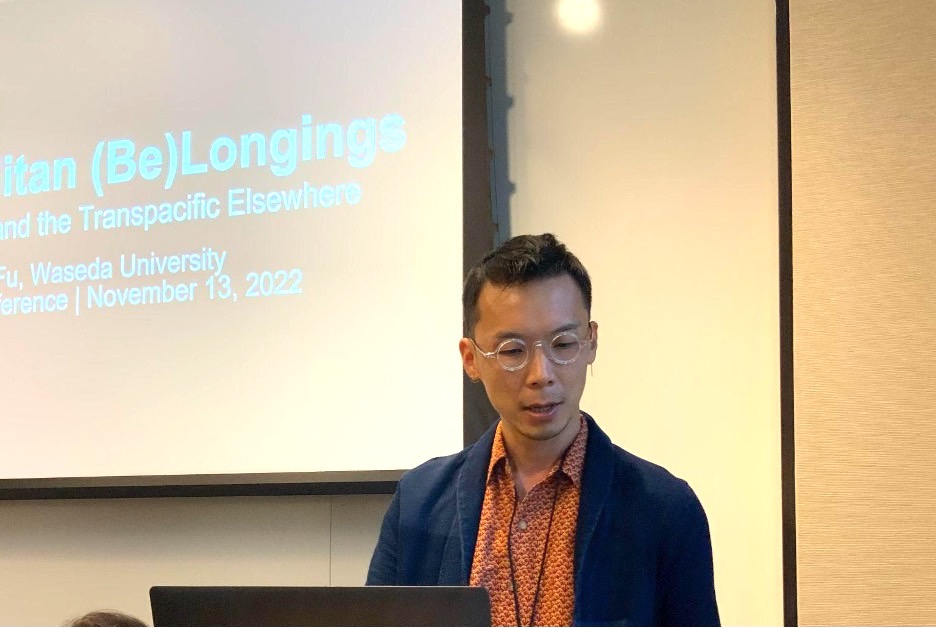Notes from a California Conference: Helpful tips from a doctoral student
Wed, Dec 7, 2022-
Tags
Notes from a California Conference
No matter the stage of your career, whether you’re just starting out in graduate school or already a tenured professor, academic conferences are an important venue for sharing works-in-progress, learning about other people’s research, and networking and socializing with peers and prospective colleagues.
I recently had the pleasure of attending the Pacific and Ancient Modern Language Association (PAMLA) conference in Los Angeles, where I presented an overview of my doctoral dissertation as part of a panel on “Asian American Literary and Cultural Studies.” This was my second conference presentation as a doctoral student and well worth the overseas voyage. Here’s a brief road map for how I got there.
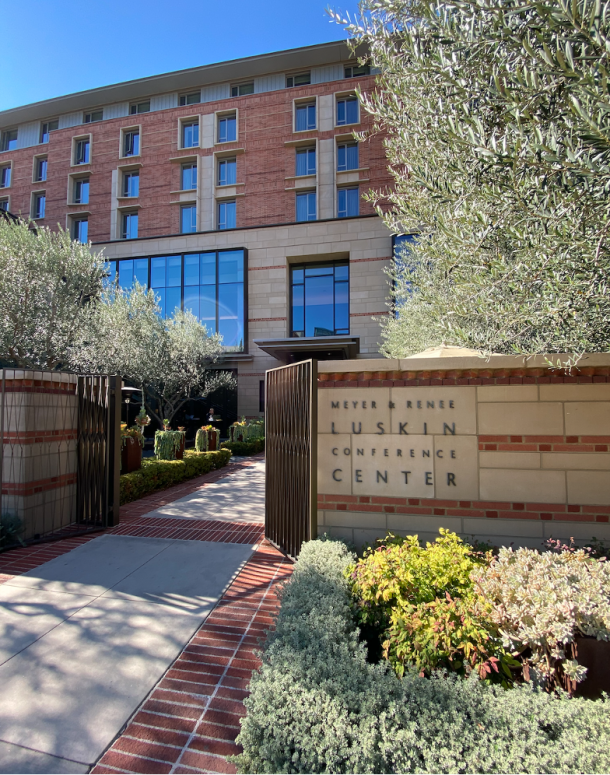
UCLA’s Luskin Conference Center, where PAMLA was held this year.
Step One: Finding the Right Conference
Chances are you may already be aware of the major conferences in your field. Many conferences are annual occurrences, and you’ve probably caught wind of them from your professors or classmates or by staying tuned in to announcements from your department or school. For instance, I’ve known about the Association for Asian Studies (AAS) conference since my first foray into graduate studies more than a decade ago. Major organizations like AAS often not only run their own yearly gathering, but also have subsidiary and/or regional conferences like AAS-in-Asia, similar to PAMLA’s own status as the western regional affiliate of the larger Modern Language Association (MLA).
I’ve long been subscribed to a listserv called H-Net, which aggregates opportunities and announcements across the humanities and social sciences. Academic research can be such a solitary endeavor, but it’s good to remember that one’s output and career never exist in a vacuum. If you envision yourself pursuing a career in the university setting, you’ll need to meet plenty of people and get to know what they’re working on in their respective fields. Conferences are a great place to begin.
Step Two: Submitting an Abstract
I read about PAMLA’s call for submissions in an H-Net announcement back in March. After browsing through the list of proposals, I ultimately decided that my research project would fit best in the domain of Asian American studies, for which there were several different panels being organized. My doctoral dissertation seeks to define a transpacific imaginary constructed through the encounter of Asian American creative communities with East Asian cultural forms. I thought this conference would be a great opportunity to test out some of my claims and share this work with an audience outside of Waseda.
Typically, all you need to do at this stage is write up an abstract of several hundred words that frames your presentation in the context of your methodologies and/or main research questions. I had a small but significant chunk of my dissertation written by this time, but even now I’m still far from the finish line. If you’re a graduate student, you likely already have written plenty of condensed versions of your work for seminar papers, fellowship opportunities, and departmental documentation. It should be relatively easy to adapt these texts and come up with an abstract in short order.
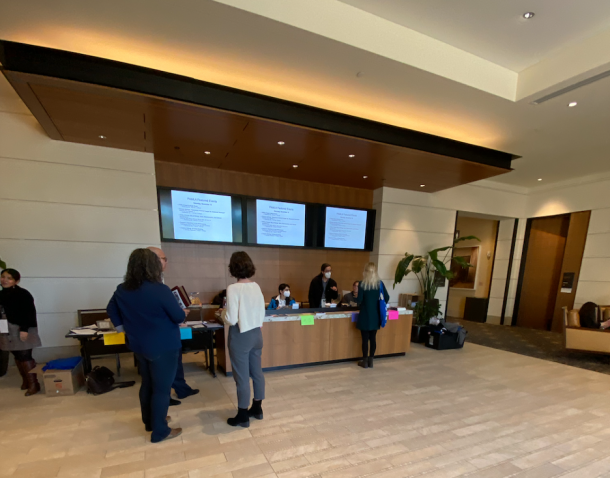
The registration desk at PAMLA 2022.
Step Three: Planning the Trip
I was delighted to receive an email notification of my acceptance into the “Asian American Literary and Cultural Studies” panel after I submitted my abstract. From then on, I was in touch with Professor Hyeryung Hwang of Cal Poly Pomona, who was the convener of the two back-to-back panels dedicated to this theme. In order to attend and present at a conference, you’ll need to pay a registration and membership fee to the organization hosting the event. Luckily, there are often significant discounts for graduate students. Make sure to keep an eye on deadlines, as conferences usually have early bird rates that offer a further discount, if you know that you can commit to attending.
I booked my round-trip from Tokyo to Los Angeles back in July, several months ahead of the conference in November, at a very reasonable price. Two further sources of financial support were indispensable in making this trip a reality for me: PAMLA’s Graduate Student Scholarship Fund and Waseda University’s Overseas Research Travel Grant Program. Be sure to inquire with your department about available funding, as this can definitely alleviate some of the financial burden of such a trip.
Step Four: Preparing the Presentation
In many ways, graduate school is an excellent training (or baptism by fire) in time management. The organizer of your panel will usually share details about the format, the allotted time for presentations, audiovisual capabilities, and so on. Then it’s up to you to get your paper or presentation in order, create a slide deck if applicable, and practice until you feel confident. Be sure to confirm with the organizer if you have any doubts about logistics, Q&A, AV, and so on. Some panels may expect you to share an academic paper of a certain length, at least with the other presenters; others are more casual and will simply rely on your presentation at the actual conference.
I started working on my presentation several weeks before the conference, while I was in the midst of writing some later chapters of my dissertation and concurrently revising my introduction. This turned out to be a perfect moment for me to step back from the weeds and imagine how to distill my project for an audience encountering my work for the first time. Melting down countless hours of research and writing into talking points for a presentation of less than twenty minutes is indeed a useful exercise.
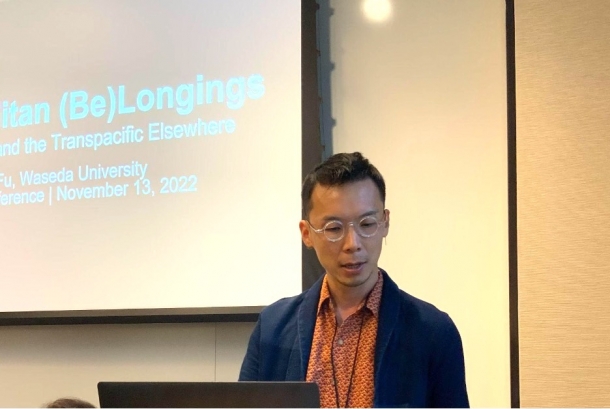
Yours truly presenting on the “Asian American Literary and Cultural Studies” panel.
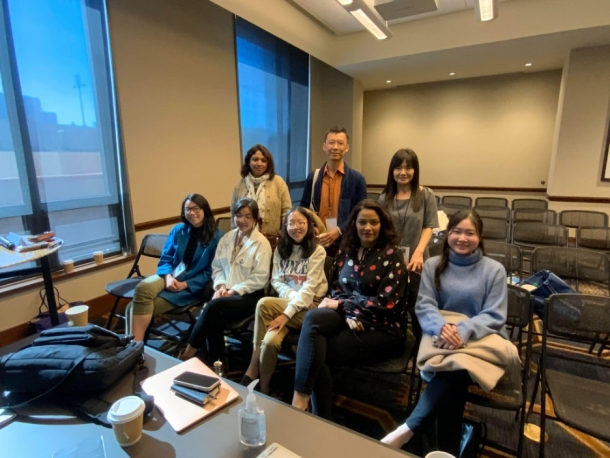
With speakers from both panels and Dr. Hyeryung Hwang, the organizer.
Step Five: Bon Voyage
I spent just under a week in Los Angeles. PAMLA’s organizers graciously provided us with a daily breakfast buffet, free-flowing coffee and snacks throughout the day, and a dinner reception to open the conference. I attended a range of events, some directly related to my research, such as a discussion on food studies and cultural identity, and others simply out of curiosity, like a literary panel on the politics of passing. PAMLA’s presidential address on the urban history of L.A. also helped ground the conference in the context of the city that hosted us.
My panel began on Sunday morning at 8:30 am. I was concerned about the early time slot, but was pleasantly surprised by the decent audience turnout and excellent questions and feedback I received. My fellow panelists were professors from northern California and India who shared work on Asian American novelists Lisa Ko and Amy Tan, while I broadened the conversation into the domains of film and food in my explorations of a contemporary Asian American cultural identity with transnational and intertextual tendencies.
I was able to connect with several audience members after the panel wrapped up, as well, and ultimately left the conference feeling invigorated and inspired by the wide-ranging, provocative work of the students and professors I encountered. PAMLA reminded me of the importance of community and the value of coming together with colleagues beyond institutional, disciplinary, and national borders.
During my stay in Los Angeles, I also made time to catch up with some old friends, since I went to undergrad in the city, and enjoy the kind of Mexican food that simply can’t be found in Japan. Conferences can be wonderful venues for all the reasons enumerated above, but it can be intellectually demanding to even be a passive observer or audience member for long. Self-care is not only important, but integral. It’s good to know when to give yourself a break; only then can you come back to the work with greater clarity than before.
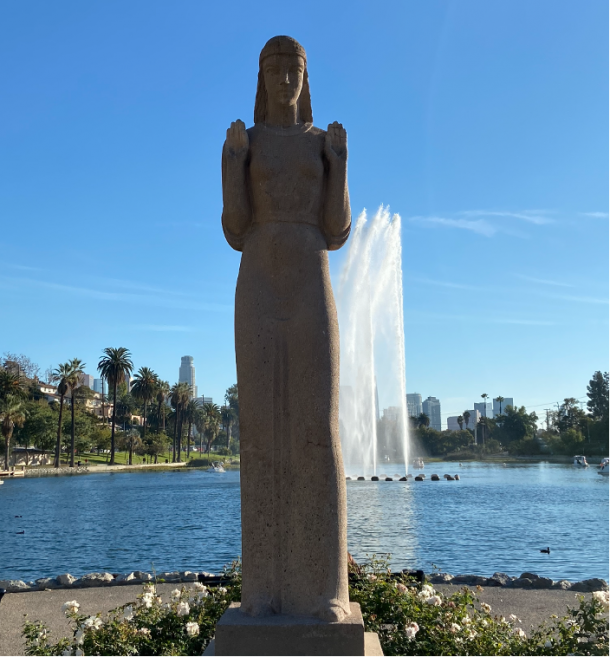
A sunny afternoon in Echo Park.
*This article was written and contributed by the following student.
Student Contributor
Mike Fu
Graduate School of International Culture and Communication Studies


